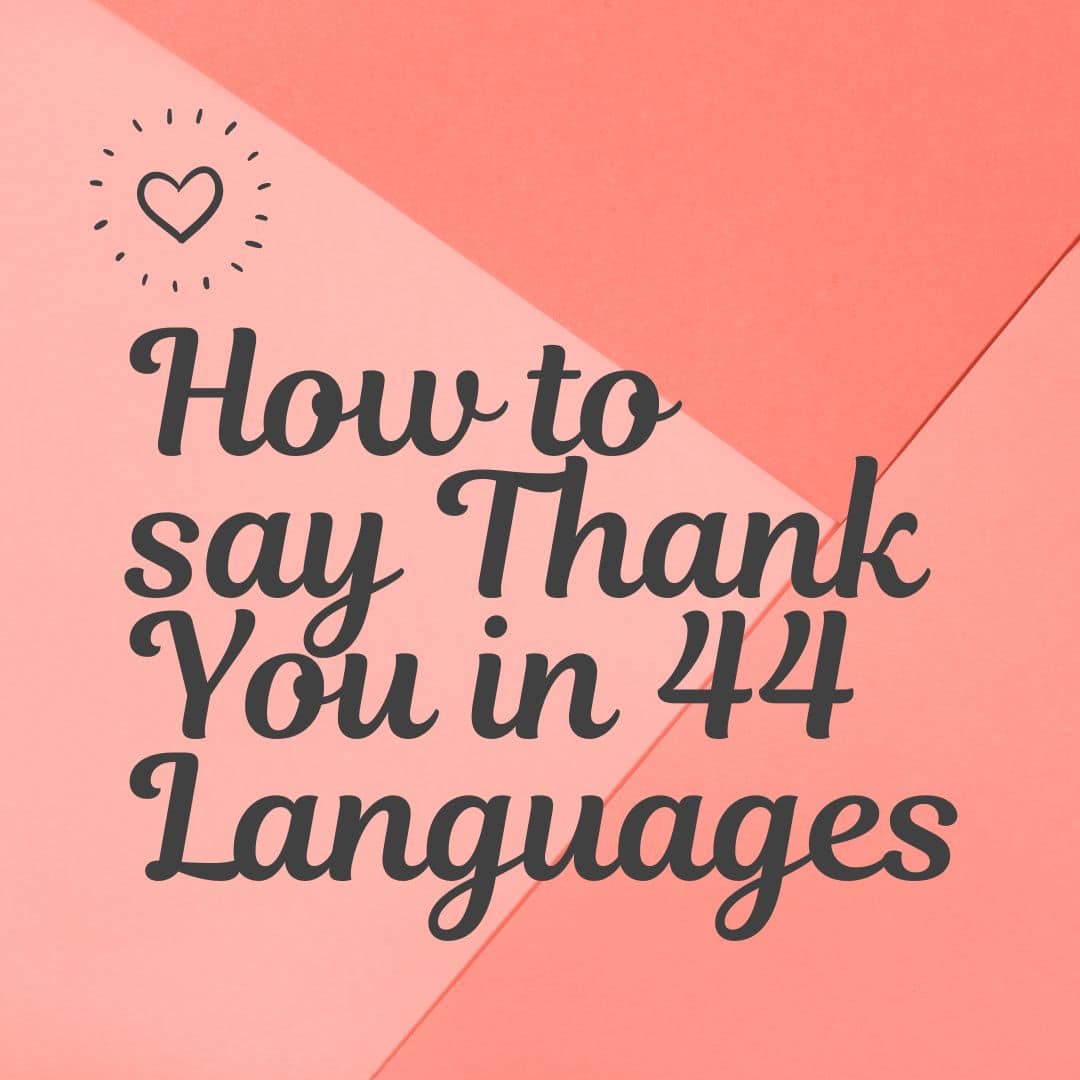
How to say Thank You in 44 Languages
By TripfixAs a traveler, one of the main reasons we love to get out there and visit far-off places is to indulge our desire to experience cultures. Honestly, not speaking the language or generally having a clue what’s happening is part of the fun!
Yes, you could mutter “Thank You” in English but wouldn’t it be great if you could loudly and proudly converse, even just a little bit, with the locals? They’d appreciate it, that’s for sure.
To make that a bit easier, I’ve spent the past 6 hours on Google compiling this list of ways to say ‘thank you in 44 languages. Please take a look, soak it up, and then take to the comments box below to share any useful phrases of your own with would-be travelers.

Mandarin – China, Malaysia Singapore, Taiwan
Xie xie (pronounced ‘shay shay’)
Spanish – Spain, South and Central America except Brazil
Gracias (as a general rule, it’s pronounced ‘gra-thee-ass’ in Spain and ‘gra-see-ass’ in South America)
Hindi – India
Shukria (pronunced suk-ri-yaa) or dhanyawaad (pronounced ‘dhuhn-Ya-Vaad’)
Arabic – North Africa, Middle East
Shukran (pronounced ‘shook-ran’)
Portuguese – Portugal, Brazil, Mozambique
Obrigado (pronounced ‘ob-ree-gado’) for a man.
Obrigada (pronounced ‘ob-ree-gada’) for a woman.
Bengali – Banglasdesh, India
Tōmākē dhan’yabāda (pronounced ‘dhon-no-baad’)
Russian – Russia, Israel, Mongolia
Spasiba (pronounced ‘spa-see-ba’)
Japanese – Japan
Arigatō (pronounced ‘ah-ree-gah-toe’)
Fijian – Fiji
Vinaka (pronounced ‘vin-ya-ka’)
German – Germany, Switzerland, Austria, Belgium
Danke (pronounced ‘dank-uh’)
Malay/Indonesian – Malaysia, Indonesia
Terima kasih (pronounced ‘tuh-ree-mah kah-see’)
Vietnamese – Vietnam
Cảm on (pronounced ‘gahm-uhn’)
Korean – North and South Korea
Komapsumnida (pronounced ‘gam-sa-hap-ni-da’) or kamsahamnida (‘kam-sam-nee-dah)
French – France, Belgium, Canada, parts of Africa
Merci (pronounced ‘mair-see’)
Marathi – India
Dhanyawaad (pronounced ‘dhuhn-Ya-vaad’)
Tamil – India, Singapore, Malaysia Mautitius
Nandri (pronounced ‘nan-dri’)
Urdu – Pakistan, India
Shukria (pronounced ‘suk-ri-yaa’)
Turkish – Turkey, Greece, Bulgaria
Teşekkürler (pronounced ‘te-shek-kewr-lehr’)
Italian – Italy, Switzerland
Grazie (pronounced ‘gra-ziee’)
Cantonese – Hong Kong, China
M̀h’gōi (use this for when someone does something for you i.e when a waiter puts down your food. Pronounced ‘m-goi’)
Dōjeh (use this for when someone gives you something i.e a gift, or a lift somewhere. Pronounced ‘do-ze’)
Thai – Thailand
Khob-kun-Ka If you are a woman (pronounced kob-koon-ka)
Khob-kun-Krub If you are a man (pronounced kob-koon-kab)
Armenian – Armenia, Russia, Middle East
Shnorhakalut’yun (pronounced ‘shuh-nor-ha-ga-lu-tune’)
Gugarati – India, Bangladesh
Dhanyawaad (pronounced ‘dhuhn-ya-vaad’) or aabhar
Albanian – Albania
Falemnderit (pronounced ‘fah-lehm-meen-deh-reet’)
Polish – Poland
Dziękuję (pronounced ‘jen-ku-je’)
Burmese – Burma/Myanmar
Chezu tinbade (pronounced ‘chei-zu tin-bar-te’)
Romanian – Romania, Moldova
Mulţumesc (pronounced ‘mult-zoo-mesc’)
Kurdish – Iraq, Iran, Turkey, Syria
Sipas (pronounced ‘si-pas’)
Azerbaijani – Azerbaijan, Turkey, Iran
Sag olun (pronounced ‘sa-olun’)
Visayan/Cebuano – Philippines
Salamat (pronounced ‘sal-amat’)
Dutch – Netherlands, Belgium
Dank je (pronounced ‘dahnk yuh’)
Serbo-Croatian – Serbia, Croatia, Bosnia
Hvala (pronounced ‘hvah-lah’)
Nepali – Nepal
Dhanyabaad (pronounced ‘dhan-naii-bat’)
Khmer – Cambodia
Ar kun (pronounced ‘aw-kunh’)
Somali – Somalia
Mahad sanid (pronounced ‘me-had sen-eed’)
Hungarian – Hungary
Köszönöm (pronounced ‘khoe-se-noem’)
Greek – Greece, Cyprus
Efcharisto (pronounced ‘ef-κha-ree-sto’)
Chichewa/Chewa – Malawi, Mozambique, Zambia
Zikomo (pronounced ‘zee-ko-mo’)
Hebrew – Israel
Toda (pronounced ‘toe-dah’)
Czech – Czech Rebublic
Děkuji (pronounced ‘dye-koo-yi’)
Zulu – South Africa
Ngiyabonga (pronounced ni(knee)-ya-bonga’)
Hawaiian – Hawaii
Mahalo (pronounced ‘ma-ha-lo’)
Swedish – Sweden, Finland
Tack (pronounced ‘tack’)
Lao = Laos
Khawp jai (pronounced ‘kah-awb jai’)